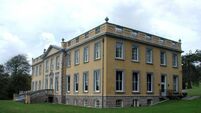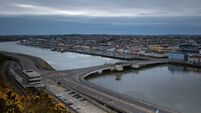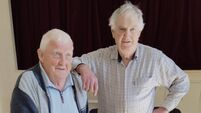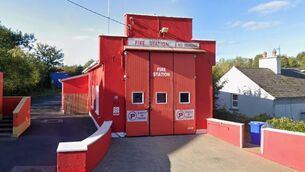Waterford Distillery founder talks of buy back hopes and what went wrong
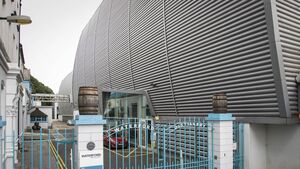
‘Everything but the kitchen sink has got in the way’, said Mark Reynier, the founder of Waterford Whiskey. Photo: Joe Evans.
As bottle after bottle was released from the former Guinness brewery on Grattan Quay, the awards poured in and the Déise’s latest superlative export began to develop a name in the world of whisky.
With innovative new techniques and a commitment to locally sourced ingredients, Waterford Distillery was breathing a new soul into the old spirit, developing a cult following. So a wave of shock and surprise reverberated around the south east and the world when the news broke that Waterford Whisky, with its 20 employees, had entered receivership.
“The best laid plans and all that!” said Mark Reynier, the founder of Waterford Distillery, who spoke to Waterford News & Star in his personal capacity about his hopes to regain control over the business, the outpouring of support and to explain what went wrong.
Reynier, a wine industry veteran first turned around the Scotch whisky brand Bruichladdich before its sale to Remy Cointreau at a significant profit.
Turning his eye to the Déise, MR Reynier bought the former Diageo brewery to create a new brand based on the concept of terroir, the flavour profile developed by local Waterford farmers.
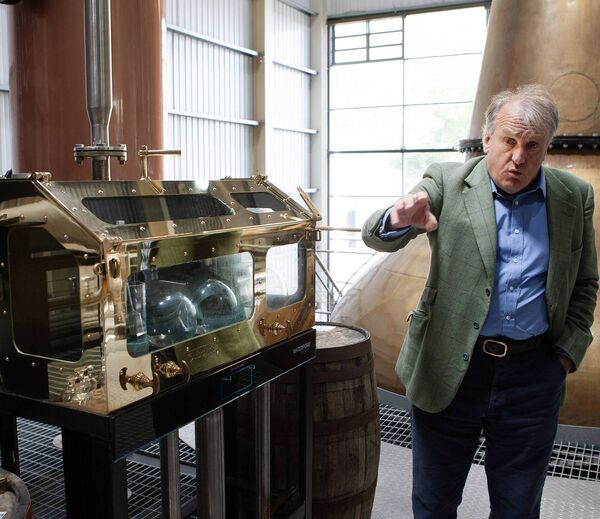
So what went wrong?
“The original business plan,” Mr Reynier explained, “was to distil one million litres a year to build up a war chest of superlative Irish barley distilled spirit of fantastic quality, which got great reviews all around the world.”
“The reason for getting that significant volume together was threefold; one was to make sure that we had an unparalleled selection from which to choose when making our bottling.
"The other was to ensure that in the future, we had enough stock built up to last us way, way into the future, as the brand would become older and older and older as time went by, and thirdly, as an insurance policy - a get out of jail card - that when things got difficult, when things got bad, we would be able to sell some of these surplus bottles into the industry, into the market.
“Unfortunately, when I came up with that idea, I didn't anticipate the series of circumstances that we all find ourselves in right now, where the cost of interest has gone from 0.25 per cent to 5.25 per cent, the cost-of-living crisis, the energy costs, inflation and the constipated supply chain in the drinks industry - one of the worst periods for the drinks industry in 40 years. I didn't anticipate COVID, and I didn't anticipate the post-COVID malaise that there has been.”
“So, when I reached for the emergency chain to sell some of our bottles, we were too late. Everybody else had it flooded the market, the big distillers had flooded the market.”
With an inability to unlock the potential sealed into those bottles of liquid gold, Mr Reynier said the “costs were bleeding us dry, and we had an inability to develop our sales because of the market situation globally.”
“We were haemorrhaging and eventually the board said, ‘look, we've got to protect the business here. So, we'll need to protect it by putting it into receivership.’ Interpath has come along, and they are running the show - it will buy time for a sales process to occur which will happen in January.”
Mr Reynier didn’t take the receivership lying down, he fought to prevent his distillery from going under, looking for an investor to buy into or take over the business to ensure its future.
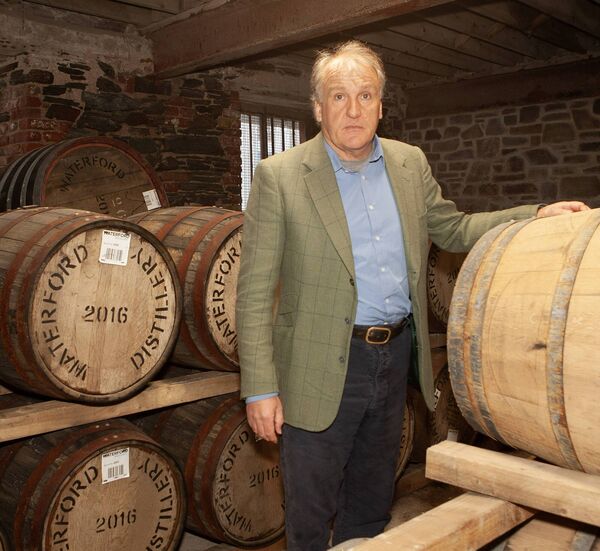
The drinks giants, he said, “loved what we did and loved the idea of the single farm quality; they want to buy into brands that have proven sales, and we hadn't got them."
"They want to see 30,000-40,000 cases and then they go, ‘right, we'll pull that down our supply line, and we'll sell, sell 10 times as much'," he said.
"But we hadn't got that because we went to market literally the day before lockdown," he added.
He said the company had to call off the launch of its first bottle, ‘The Pilgrimage’, due to lockdown: “So, starting our brand on the eve of COVID was not ideal.”
Due to the pandemic, the brand was unable to “establish the brand the way it should be - with a clear run at it - and then in the post-COVID era you've got the interest rates, inflation, the cost-of-living crisis, and people not buying any whiskey or wine.”
He admitted that the market conditions affect everybody, but said the impacts weigh more heavily on newer businesses.
“Of course, you could say ‘Oh yeah, that's the same for everybody," he said.
"Yes, that's true but you know, when you're a new brand, you just don't have the meat on the bone. Just when you want to grow, you can't - that's the grim reality."
“So, the very policy of laying down that stock became a millstone, because the cost of the interest that we were paying outweighed the revenue that we were able to get from selling cased goods,” he said.
“The frustration is, when I did my first distillery, we had a perfect run at it! Whereas here, everything but the kitchen sink has got in the way,” he added.
“It's like casting seeds, you know that parable, some of it falls on fertile ground and germinates and grows, others on hard, barren ground, and it shrivels up and dies. It feels very much like that. Even with the best will in the world and the greatest spirit, it just wouldn’t work.
“You just have to look at the international recognition for the quality of spirit from that extraordinary distillery that we created - the great bottlings under Ned and Neil running the distillery, I couldn't have asked for more.
“It was exactly what I wanted and envisaged. I just regret that I've not been able to see it through. It hurts a lot.” So what now? Is there any kind of hope of Mark Reynier retaining control of the business or will it be a sale of assets?
It’s likely, that there will be a sales process of the business in the New Year, “with any luck, we might be able to regain control,” Reynier said, “So we have to wait and see!”
He is trying to build a new consortium to wrest back control over the business through that process: “I've got one or two shareholders that are up for it. Waterford Mk. II would be a different experience once rid of that debt burden.” Mr Reynier said that, even in the “very difficult era since COVID”, the foundations of a successful business have been built.
“It's a cumulative process; we've put those foundations down,” he said, adding: “Now, the trouble is that you don't see the foundation - all that effort and the money that you invest goes into the ground where you don't see it! It's only when the building gets above ground that it goes up very quickly.”
Despite the challenges of the market and economic pressures upon the business, Mr Reynier says that is where the company was getting to in recent months.
“Despite everything, we were just about getting to that level. The effort, the investment, the time was starting [to pay off] but what it needs is the market to turn.”
He believes that conditions in the market are beginning to improve: “A lot of industry observers believe that the International de-stocking era will work its way through the system next year, and we'll get back to some degree of normality.” Mr Reynier said he doesn’t know what form the sales process in January will take, commenting: “I would have a feeling it will be the assets, the stock, which is considerably more than [€40 million] now, and the distillery.”
“Now, remember the distillery is a brewery, it’s a state-of-the-art brewery,” he said.
“The reason I wanted that brewery is because the way you liberate the barley’s flavour is in the brewing side of it, the distilling bit is relatively easy. I think what makes Waterford Distillery so special, is its ability to produce that quality spirit, because the focus is on the barley and how to liberate that barley’s flavour. That's the extraordinary nature of what we have been able to do there.
“So as a distilling operation, it's unique - it's absolutely unique. So, I hope to goodness that that continues.
“If I get my way, if I am able to pull it off, I want to carry on doing what we were doing because we weren't far away, and with the much anticipated and eagerly awaited change of market conditions it would, I think, be a very different story.” How would it actually work for Mr Reynier to take back control of the business? Is it just a case of securing new capital to buy back the business?
He was quick to take responsibility for the situation Waterford Whisky finds itself in. “I'm not blaming anybody here, get that really clear, I'm not blaming anybody,” he said.
“I'm not going to moan and say, ‘Oh, well, it was that person’,” he added.
“No, these are my decisions - this was my business plan. [The bank] delivered what I asked them to deliver. No, it's hands up. I'm driving the ship, and it's my problem.” He said HSBC, who set up a revolving credit facility with the Distillery, were “plenty reasonable” and enabled them to build up a “war chest” of whisky.
The problem, he said was just that the interest payments – starting at 0.25 per cent - went up 21-fold: “That was the problem!”
“If our sales had evolved on a normal trajectory, in normal conditions, it wouldn't have been so much of a problem, but it didn’t,” he said.
Ultimately, he says, it came down to the fact that the business, relying on case sales, was unable to “deliver the revenues that could handle the interest payments for having distilled 6.7 million litres of single malt whisky.” What is Mr Reynier’s outlook now?
“Well, I mean, Christ, what can I say? It feels like you’ve had the rug pulled from under your feet,” he admitted.
“It's a pretty miserable experience - I wouldn't wish it on anybody,” he said.
“That effort, that work, it hurts, it hurts a lot.” However, he was “amazed” by the outpouring of support from people across Waterford but also within the whiskey industry.
“The messages of support have been unbelievable,” he said.
“People at the beginning were doubters and naysayers,” he said, but added the whisky “really moved the dial” and is a “game changer”.
The distillery founder said he is “hopeful” that he will be able to buy back the distillery and continue this extraordinary Waterford story.
“I haven't finished it, there is more to do,” he said.
“Yes, there's a financial element to it, of course, but there's also a much bigger picture. We're coming up in 2026, to a 10th anniversary of our whiskey - that's when people really sit up and pay attention internationally to whiskey - I just want to be able to get there.” “That spirit is sensational, and not just a little bit of it, but right across the board,” he said.
“The spirit stock is pretty special, and it's a pretty unique distillery to with a great, great team running it, and I'm just extremely disappointed that I've let them down,” he added.
“This whisky is too good to lose. It's too good not to have the right end to the story and so that's why I want to be involved in ensuring the future of it, because it's too good to go.”
